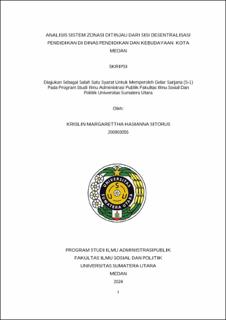| dc.description.abstract | One strategy for providing effective education is through a zoning system. In the era of decentralization, the Department of Education and Culture is fully responsible for implementing the zoning system as a decentralized implementation for accepting new students in Medan City. However, there are still problems in the implementation of decentralized education, especially the zoning system, starting from buying and selling seats, Google Maps which are considered to be troublesome for the community, quotas that are too large, to the lack of school availability. So the researcher took the title "Analysis of the Zoning System Viewed from the Decentralized Side of Education in the Medan City Education and Culture Service." The aim of this research is to analyze and describe the zoning system viewed from the decentralization side in the Medan City Education Office.
The research method used in this research is descriptive qualitative. Informants in this research: Head of the Manpower Division, Medan, Head of the Middle School Development Division, Head of the Middle School Curriculum Section, Elementary Level Policy Review Staff, Policy Technical Review Staff, Elementary and Middle School Principals, Medan City DPRD Members, Legal Office Staff Mayor of Medan, Non-Governmental Organizations in Medan City, Parents of Students affected by the zoning system Data analysis techniques in the form of data reduction, data presentation and drawing conclusions. This research uses the incremental model proposed by Linbolm with several analytical indicators: adjustment to community conditions and needs, ongoing renewal and participation of actors and stakeholders.
The results of this research show that the Medan City Education and Culture Office has taken minimum percentage steps and used Google Maps which is considered ideal, Medan City still lacks public schools in two sub-districts. Continuous renewal, in accordance with changes to mayoral regulations referring to the Minister of Education and Culture, has had a positive impact on the decentralization of education, especially the zoning system in Medan City. Apart from that, the participation of actors and stakeholders, the Medan City Education and Culture Office shows full commitment to collaboration with the Communications and Information Service, NGOs and local governments. The advice given is to speed up school construction and pay attention to students who live in remote areas so that all students in Medan City can get quality education.
Keywords: Decentralization of Education, Medan City Education and Culture Office, Zoning System.Keywords: Decentralization of Education, Medan City | en_US |





